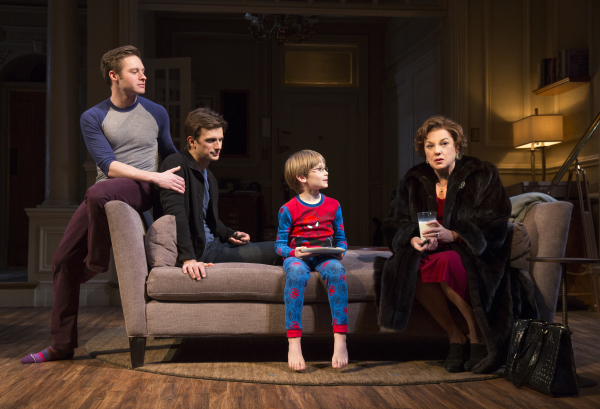Mothers and Sons

(© Joan Marcus)
It’s been 20 years since Andre died, and his mother, Katharine Gerard, still hasn’t recovered from his loss. Katharine's grief is still so heavy that she finds herself on the doorstep of Cal — Andre’s former lover — now married to a different man and raising a young son. He’s moved on, she’s thinking bitterly. Why haven’t I?
Thus the plot of Mothers and Sons, Terrence McNally’s new drama at the John Golden Theatre, is set into motion. McNally’s 20th Broadway play, directed by Sheryl Kaller, is a sequel of sorts to an earlier work, an eight-minute one-act called Andre’s Mother, which was later turned into an Emmy-winning film for PBS’ American Playhouse series. That piece took place during Andre’s memorial service in Central Park, where Cal and Katharine released balloons into the sky so the soul could symbolically ascend into heaven. She had nothing to say then, but she has a lot to say now.
As played by Tyne Daly in one of the production's four superbly layered performances, you hang onto Katharine’s every word, even when they're not so nice. One major point of contention in the relationship of Katharine and Andre is that she could never come to terms with his homosexuality and eventual AIDS-related death. Her homophobia is still on display two decades later, despite a world that has changed around her.
This new world sees money manager Cal (Frederick Weller) living in a Central Park West apartment with his aspiring novelist husband, Will (Bobby Steggert), and their precocious six-year-old son, Bud (Grayson Taylor). When Katharine shows up unannounced to drop off a journal of Andre's that she has found, she can't even bring herself to utter the word husband, let alone believe that two men could be married and have a child. Conversely, Will, significantly younger than Cal, is of the age group for which this is commonplace, and he can't imagine that anyone would still have such a hard time dealing with it. Pleasantries are blithely exchanged, drinks are drunk, longstanding tensions simmer to the surface, and tears are shed.
Mothers and Sons is really at its best when McNally isn't specifically aiming for the tear ducts, movie-of-the-week style. The play hits its emotional heights when McNally is simply presenting three flawed adults whose individual prejudices stand in their way of true understanding. Steggert, in what's possibly the play's toughest role, does an extraordinary job navigating the sudden tonal shift within Will, who goes from affable to venomous in a single line of dialogue. Similarly, Weller brings a gut-wrenching honesty to Cal, despite the character's tendency to start spouting the kind of urbane witticisms you'd find in a New Yorker short story. As Bud, Taylor is a real find who brings delightful levity to a room where the memories of a lost generation looms heavily.
But most of all, the production belongs to Daly, whose work here ranks among her very best. With as much dialogue in her facial expressions as there are actual lines, Daly parcels out delicate, humane flourishes to a woman who could easily fall into caricature. When Katharine's charm turns into hostility, it's not out of hatred. It's because her son is not there. When she silently skulks around the room in a fur coat (costumes by Jess Goldstein), you can tell her eyes are thinking, this apartment should be my son's.
That apartment, designed by John Lee Beatty, becomes the play's fifth character, the white-walled, high-ceilinged domicile with a breathtaking view of the sunset over Central Park (lighting by Jeff Croiter) is a home everyone aspires to own. The struggles of wealthy New Yorkers, written about so frequently in the canon of American drama, isn't something most people can relate to, but there's enough in the play that makes Katharine, Cal, Will, and Bud people whom you know. Audience members who get misty at the mere mention of death should be armed with a pocketful of tissues while watching Mothers and Sons. But most of all, this new play will leave you longing for a hug from your partner and wanting to hold him or her tight. Because you never know when they won't be there anymore.










